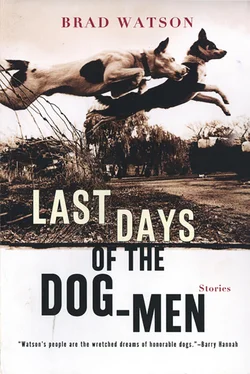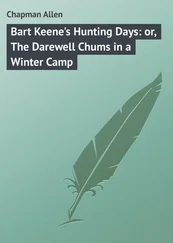“Oh,” he whispered, eyes welling, “poor thing.” He shut off the light and lay in the dark beside her. Above him, the shuffling sounds of the living were creaky and vague.
ON THE LONG GREEN LAWN THAT LED DOWN TO THE lake, Bailey’s boy tumbled with their two chocolate Labs, Buddy and Junior. The seven of us sat on Bailey’s veranda sipping bourbon and watching the boy and his dogs, watching partly because of what Bailey had just told us about the younger dog, Buddy’s progeny, a fat brute and a bully. Bailey had chosen Buddy’s mate carefully, but the union had produced a pure idiot. A little genetic imbalance, Bailey said, hard to avoid with these popular breeds.
Watching Junior you could see that this dog was aggressively stupid. A reckless, lumbering beast with no light in his eyes, floundering onto old Buddy’s back, slamming into the boy and knocking him down. The boy is about ten or eleven and named Ulysses though they call him Lee (sort of a joke), thin as a tenpenny nail, with spectacles like his mama. He was eating it up, rolling in the grass and laughing like a lord-god woodpecker, Junior rooting at him like a hog.
“I hate that dog,” Bailey said. “But Lee won’t let me get rid of him.”
The slow motions of cumulus splayed light across the lawn and lake in soft golden spars, the effect upon me narcotic. My weight pressed into the Adirondack chair as if I were paralyzed from the chest down. Bailey planned this place to be like an old-fashioned lake house, long and low with a railed porch all around. Jack McAdams, with us this day, landscaped the slope to the water, then laid St. Augustine around the dogwoods, redbuds, and a thick American beech, its smooth trunk marked with tumorous carvings. Three sycamores and a sweet gum line the shore down toward the woods. The water’s surface was only slightly disturbed, like the old glass panes Bailey bought and put in his windows.
Russell took our glasses and served us frosty mint juleps from a silver tray. Silent Russell. The color and texture of Cameroon tobacco leaf, wearing his black slacks and white serving jacket. I am curious about him to the point of self-consciousness. I try not to stare, but want to gaze upon his face through a onesided mirror. I see things in it that may or may not be there and I’m convinced of one thing, this role of the servant is merely that: Russell walks among us as the ghost of a lost civilization.
Bailey says Russell’s family has been with his since the latter’s post-Civil War Brazilian exile, when Bailey’s great-great-grandfather fled to hack a new plantation out of the rain forest. Ten years later he returned with a new fortune and workforce, a band of wild Amazonians that jealous neighbors said he treated like kings. Only Russell’s small clan lingers.
I looked at Russell and nodded to him.
“Russell,” I said.
He looked at me a long moment and nodded his old gray head.
“Yah,” he said, followed in his way with the barely audible “sah.” After he’d handed drinks out all around, he went back inside the house.
“Russell makes the best goddamn mint julep in the world,” said Bailey, his low voice grumbly in the quiet afternoon, late summer, the first thin traces of fall in the air.
I could see two other men of Russell’s exact coloring working at the barbecue pit down in the grove that led to the boathouse. Russell’s boys. They’d had coals under the meat all night, Bailey said, and now we could see them stripping the seared, smoked pork into galvanized tubs. Beyond them, visible as occasional blurred slashing shadows between the trunks and limbs and leaves of small-growth hardwoods, were Bailey’s penned and compromised wild pigs, deballed and meat sweetening in the lakeside air. He looked to be building up a winter meatstock, product of several hunting trips to the north Florida swamps with Skeet Bagwell and Titus Smith, who were seated next to me on Bailey’s side. It seemed an unusual sport, to catch and castrate violent swine and pen them until their meat mellowed with enforced domesticity, and then to slit their throats. Russell’s boys partially covered the rectangular cooking pit with sheets of roofing tin and carried the tubs of meat around back of the house to the kitchen. Along the veranda we drank our mint juleps — McAdams, Bill Burton, Hoyt Williams, Titus, Skeet, Bailey, and me — arranged in a brief curving line in Bailey’s brand-new Adirondack chairs. Russell came out with more mint juleps, nodded, and slipped away.
“HERE’S TO LOVE,” BAILEY SAID, RAISING HIS SILVER CUP. He smiled as if about to hurt someone. Probably himself. A malignant smile. Here we go, I said to myself, I don’t want to hear it. I didn’t want to hear his story any more than I wanted to take his case. He’d called the day before and invited me to the barbecue with these men, his best friends, and said he wanted me to represent him “in this business with Maryella.” Bailey, I’d said, I’ve never handled divorces and I don’t intend to change — as criminal as some of those cases may be. I suggested he call Larry Weeks, who’s done very well with big divorce cases in this town. No, Bailey said, you come on out, come on. We’ll talk about it. I supposed at the time it was because we’ve known each other since the first grade, though in the way of those who live parallel lives without ever really touching.
So here we were. There were no women around, apparently, none of these men’s wives. I began to feel a familiar pain in my heart, as if it were filling with fluid, and it seemed I had to think about breathing in order to breathe. Even what little I knew about Bailey’s problem at the time forced me into places I didn’t want to go. So his wife has left him for his partner, I thought — so what? What else is new in the world? We all know something of that pain, to one degree or another.
Ten years ago I defended a man accused of pushing his brother off a famous outcropping in the Smoky Mountains in order to get his brother’s inheritance, set for some reason at a percentage much greater than his own. It was an odd case. There’d been several other people at the lookout, where in those days a single rail kept visitors from succumbing to vertigo and tumbling down the craggy face of the cliff. My client’s hand had rested in the small of his brother’s back as they leaned over the railing to look down when the brother — like a fledgling tumbling from the nest, one witness said— pitched over the edge and disappeared.
It was considered an accident until my client’s cousin, who had never liked or trusted him, who in fact claimed he had once dangled her by her wrists from the treehouse behind their grandmother’s home until she agreed to give him her share of their cache of Bazooka bubble gum, hired a private investigator who was able to plant the seeds of doubt in the minds of enough witnesses to bring the case before a grand jury in Knoxville. Incredibly, the guy was indicted for murder one. I thought it so outrageous that when he called I immediately took over his case, even though it meant spending time traveling back and forth across the state line.
I liked the man. While he and I prepared for trial, my wife, Dorothy, and I had him out to dinner a few times and twice even took him to my family’s old shanty on the Gulf Coast for the weekend. He and Dorothy hit it off well. Each was a lover of classical music (Doro had studied piano at the university until she gave up her hope of composing and switched to music history), and he was a tolerable pianist. They discussed the usual figures, Schubert and Brahms and Mozart, etc., as well as names I’d never heard of. They sat at the piano to study a particular phrase. They retired to the den to play old LPs Doro had brought to our marriage but which had gathered dust during the years I’d built my practice, never having had the energy to listen with her after dragging in at near midnight with a satchel full of work for the next morning. I often awoke at one or two in the morning, tie twisted and cinched against my throat, the dregs of a scotch and water in the glass in my lap, while the stereo needle scratched at the label of a recording long done easing strains of Sibelius from its grooves. In the bedroom I’d find Doro turned into the covers, her arms tossed over a pillow that covered her head, as was her sleeping habit, as if she were trying to smother herself.
Читать дальше











